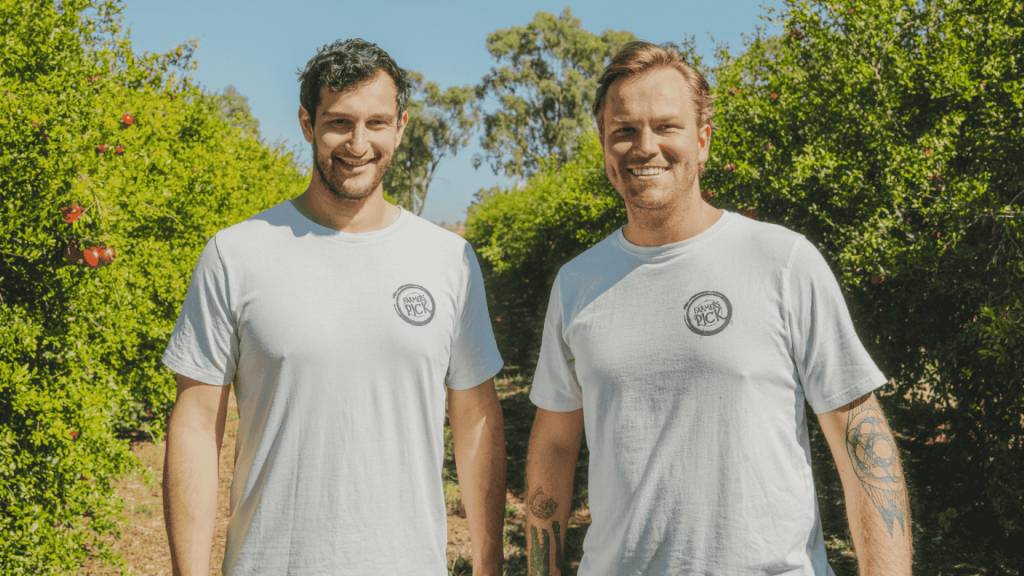If there’s one thing that makes Josh Ball happy, it’s when a farmer says he hasn’t got any misshapen vegetables to sell him.
“It’s satisfying when we go to a farmer and he says: ‘I’ve got no more produce for you. You’ve taken it all. You’ll have to find another farm,” Ball says.
“When we started we were buying about a hundred kilos a week. We were thinking, this is a nice idea, but we’re not making much of an impact. Now we buy 10 tonnes of carrots or potatoes from a single farm, and that’s quite material. In five years we’ve saved 10 million kilos of produce.”
An estimated 30% of Australian produce never makes it off the farm, partly because of supermarket demands for conformity. But since 2020, Ball and his Farmers Pick co-founder Josh Brooks-Duncan have been buying previously unwanted fruit and vegetables and delivering them to people’s homes.
Consumers love it, not least because it costs them up to 30% less than it would at the supermarket, Ball says.
As a result, just three years on, the business employs 190 people, delivers to more than 40,000 customers a month, has a run rate of $65 million, a CAGR of 123% since 2022, and relationships with 130 farmers (up from 35 in 2023). After initially serving just Victoria and New South Wales from its base in Melbourne, the business opened up a warehouse in Queensland in 2023 and can now deliver to most of the Sunshine State, too.
“It’s been a crazy ride,” Ball says. “Balancing the speed of growth and operational demands while protecting the culture, the values, and the customer experience has been very much a balancing act. It’s been a very fun challenge.”
A cool idea
The two Joshes decided to add to that challenge this year by offering The Fridge: home-delivered meat, seafood and dairy. They’d already added pantry items, such as rice and preserves, to their range in 2023, which went smoothly enough, but throwing cold goods into the mix brought a whole new set of demands.
However, it was important to them. “Our vision for the food system is all about fairness and connection,” Ball says. “We found that 86% of people don’t know where their meat comes from, and that’s a massive disconnect.”
Finding a processor to suit their needs was difficult, Ball says. “When we looked at the industry, it was either small butcher shops or massive processing facilities.”
So they partnered with a butcher to set up their own processing facility in Sydney. “By controlling that part of the supply chain, we know exactly what we’re delivering to our customers, and take full responsibility for exactly what lands on their doorstep.”
The result, Ball says, is butcher-quality meat — all grass-fed or free-range and traceable to individual family farms — at supermarket prices.
How is this possible? “Fundamentally, we have an efficient supply chain,” Ball says. “We don’t move it around. We don’t sit on excess stock. We buy what we need and what our customers are demanding, so there’s next to no wastage. We don’t have things going off. We’re able to just focus on efficiencies through procurement, supply chain, processing and delivering that give us a little bit of an edge.”
Just three months after its launch, The Fridge already accounts for 10% of orders. “People increasingly want to know where their food comes from,” Ball says. “Customers are really resonating with connection.”
Growing pains
Brooks-Duncan’s background in warehousing, supply chains and logistics has helped the business scale (as has Ball’s background in sales and marketing). But the two 30-year-olds have also needed to develop plenty of new skills along the way, including truck driving in the early days.
“That was half the job,” Ball says. “We’ve gone from being a scrappy startup to really establishing ourselves as a business, and we’ve had a lot of challenges internally, growing the team and developing the capability to deliver on the increased demand.
“But we’ve tried to have a growth mindset, and to think about these things as opportunities instead of pain points. We’ve built a team around us that’s super capable and focused, and also aligned on values and purpose.
“When you take a business from zero to something, it’s a really powerful thing. You get to understand very deeply how a business works, and why certain things are in place, and also when to break old rules to make way for the new.”
One of the key factors in the business’ success, as well as a source of great satisfaction, has been building connections with farmers, Ball says.
“We had to build trust early on — that we weren’t joking when we were talking about buying things that they were thinking about as waste. And we’ve had to build that up over time. Those relationships have deepened. They really are win-win. We want to create a fairer food system for everyone that it touches.”
Values and purpose continue to drive Ball and Brooks-Duncan forward. “There’s still so much produce that’s left out on the farm, and that’s a massive issue,” Ball says.
“Our goal is to make a meaningful and lasting change in the food system, and really challenge some of the big players. They’ve got so much power over what happens, but there’s definitely a spot for us to challenge and make a difference and have impacts on farms. Ultimately, we’d love to see the broader industry start to change the definitions of what good is.”



